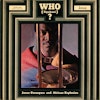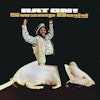Released in 1972, What Color Is Love was the Chicago folk-jazz legend’s masterpiece, and the second of three inspirational LPs for Cadet with producer, arranger, and conductor Charles Stepney.
Raised in Cabrini-Green alongside childhood friend Curtis Mayfield, Terry Callier had been singing in various doo-wop groups prior to his first single on Chess in 1962, the “northern soul” classic “Look at Me Now.” However, it was his LP for Prestige, The New Folk Sound of Terry Callier, that marked him out from the crowd. Released in 1968, the LP brought a new depth and spirituality to classics like the incredible “900 Miles,” owing as much to Fred Neil as Callier’s major inspiration, John Coltrane.
Around the same time, Charles Stepney was breaking down similar barriers with his orchestral productions for the psychedelic-soul group Rotary Connection, so when the arranger and head of A&R at Chess approached Terry Callier at Jerry Butler’s Chicago Songwriters Workshop to see if he had any songs for the Dells, the union that resulted in the vocal group’s Freedom Means LP was long overdue. A year later, Callier released the excellent Occasional Rain with Stepney, who by now was gaining more influence at Chess. This enabled him to further expand his creative vision, as Terry Callier recalled in a recent interview: “I remember one afternoon, Charles Stepney called me and said, ‘Hey, come down to Chess Studios, I want you to listen to something.’ So I dropped everything and walked into Studio A, and there were, I would say, twenty-five or twenty-six musicians.”
The end result, What Color Is Love, was the pinnacle of their three deep, spiritual, and expansive LPs recorded for Cadet. “I remember the first time I heard the string parts coming through the earphones; it felt like I was being transported to another realm,” the singer recalled. Nowhere were these strings used to more dramatic effect than on the stunning and epic opener. Based around a killer guitar hook and full of Stepney’s trademark peaks and troughs, the almost-cinematic drama of “Dancing Girl” finds Callier at the peak of his songwriting powers, weaving the story of a street girl’s decline into addiction around a lament for Charlie Parker’s own struggles.
While this is one of Callier’s most socially conscious LPs (including the Vietnam lament “Ho Tsing Mee”), he also found space for two of his most beautiful and sublime soul ballads, “Just as Long as We’re in Love” and “You Don’t Care.” In an interview in the ’90s on London’s KISS-FM, Callier told DJ Patrick Forge how Stepney preferred to work in the morning with Bach and Beethoven in the background, and there is a clarity here that owes a debt to the freshness of those breakfast-time recordings. Pure but hard-core, nearly forty years on, the power and the glory of this astonishing LP has not been diminished.


